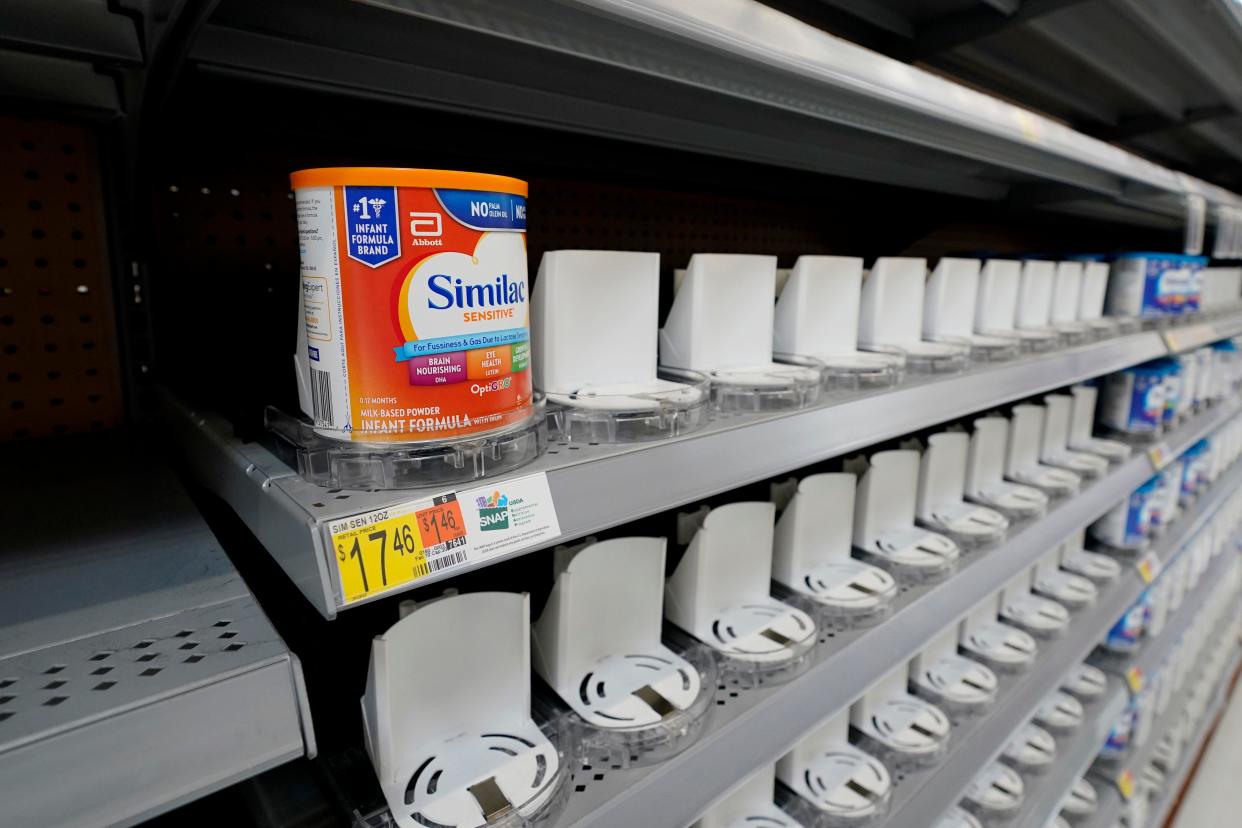Parents scramble for options to feed their babies as recall spurs formula shortage

APPLETON - In February, Abbott Laboratories, a popular baby food and formula manufacturing company, had to shut down its plant in Sturgis, Michigan following a nationwide recall on some of its products.
The recall came after the deaths of two infants who contracted a rare infection. The Food and Drug Administration investigated Abbott and found traces of the pathogen Cronobacter sakazakii in the Michigan plant, resulting in recall on Similac PM 60/40, Similac, Alimentum and EleCare powered formulas.
"The Cronobacter sakazakii that was found in environmental testing during the investigation was in non-product contact areas of the facility and has not been linked to any known infant illness," Abbott's website states.
According to the CDC, Cronobacter can cause blood infections or make the linings around the brain and spinal cord swell. Symptoms may include a fever, poor feeding, excessive crying, very low energy and seizures.
More: Baby formula shortage costing parents: 'It's a desperate situation for many families'
Two months later, parents are having a difficult time finding an adequate amount of baby formula to sustain their children.
The out-of-stock rate for formula currently sits at 40% nationwide, according to an article by CNNBusiness. In Wisconsin the rate is at 43%.
To combat the supply shortage, retail companies such as Walgreens, CVS and Target have limited the amount of formula one person can buy.
"Due to increased demand and various supplier challenges, infant and toddler formulas are seeing constraint across the country," a Walgreens spokesperson wrote in a statement. "Similar to other retailers, we put into effect purchase limits of three per transaction on all infant and toddler formula to help improve inventory."
CVS has also limited customers to only three cans per purchase, while Target has a limit of four.
Alternative solutions to the baby formula shortage
Breastfeeding is not always an option for some mothers, so baby formula is imperative to their children's survival.
Switching formula brands may be initially difficult, especially if your child is picky, but is one of the safer options when it comes to the shortage. It is always recommended to speak with your pediatrician before making any sudden changes to your child's diet.
Breastfeeding donations are also a viable option. Mothers' Milk Bank of the Western Great Lakes provides a list of Wisconsin donor milk dispensaries on their website.
Wisconsin WIC continues to offer as many formula substitutions as possible during this shortage, according to WIC Director Kari Malone.
WIC is also working with formula company representatives to get updates on supply, help locate formula at the store, and send samples of formula when available.
Wisconsin WIC and Medicaid have created a system for WIC participants to obtain Elecare and Elecare Jr. substitutions during the formula shortage with a streamlined prior authorization approval.
More information on what substitutions and resources are available for WIC participants can be found on the WIC website.
Although times may be desperate, the American Academy of Pediatrics warns parents to not feed their babies any homemade formulas.
"Homemade formula can harm infants, it might contain too many or not enough nutrients," their website states. "Infant formulas are tested by the Food and Drug Administration for quality. They provide the right amount of protein, iron and vitamins that infants need. Feeding babies homemade formula even for a few days or weeks can have lasting effects and put them at risk of getting sick."
When will formula be back in stock?
On Thursday, President Biden announced a list of ways his administration would be working to combat the lack of baby formula.
This list included increasing imports of baby formula from other countries and cracking down on any price gauging and unfair market practices related to baby formula.
"Given the production and distribution issues leading to local short supplies of infant formula, the FDA will, in the coming days, announce specific new steps it is taking concerning importing certain infant formula products from abroad," the news release stated.
Abbott Laboratories has announced that they have been increasing production of formula at their other plants to make up for the Sturgis plant being shut down.
"We have prioritized infant formula production at our Columbus, Ohio, facility, converting other liquid manufacturing lines into manufacturing Similac liquid ready-to-feed," its website states.
In a statement on Wednesday, Abbott Laboratories said that the Sturgis site could be up and running within the next two weeks, pending approval from the FDA. However, it could still take up to eight weeks from the factory start up date for formula to make it back onto store shelves.
"We would begin production of EleCare, Alimentum and metabolic formulas first and then begin production of Similac and other formulas," the website stated.
The company is also importing Similac from their facility in Ireland, as well as releasing metabolic formulas that were on hold earlier this month at the FDA's request.
Reach Jelissa Burns at 920-226-4241 or jburns1@gannett.com. Follow her on Twitter at @burns_jelissa or on Instagram at burns_jelissa.
This article originally appeared on Appleton Post-Crescent: Wisconsin baby formula shortages: Here's what to know, do for parents

